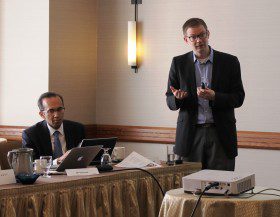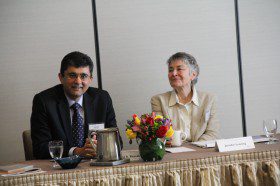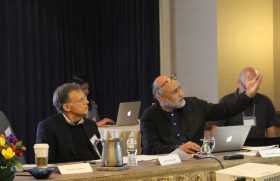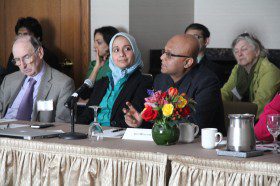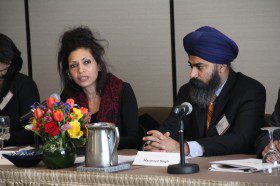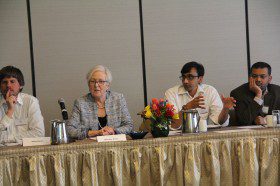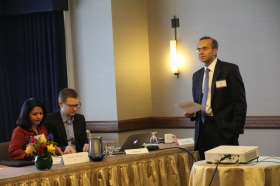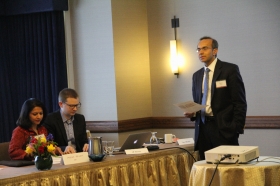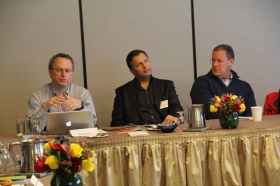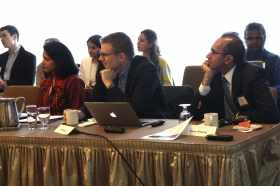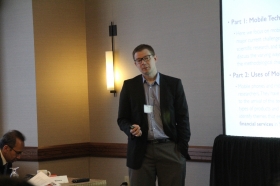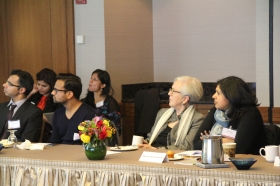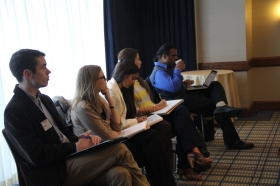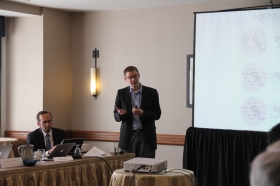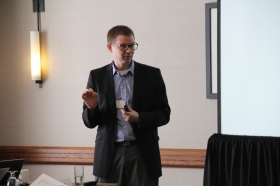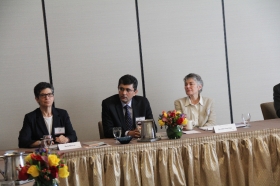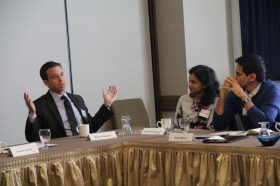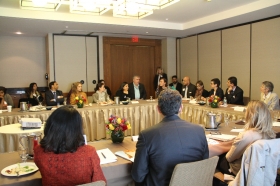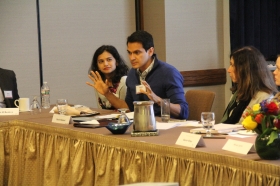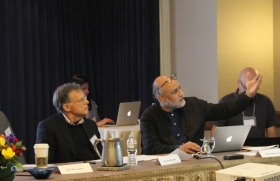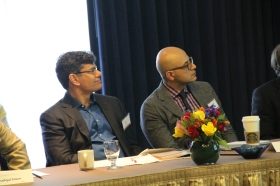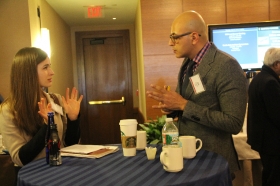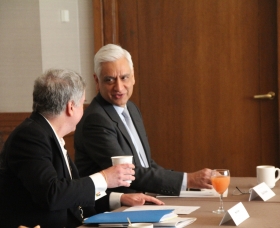SAI held its Annual Symposium on April 24 and 25, 2014, titled ‘South Asia Regionalism: Workshops on Shared Challenges and the Way Forward.’ The workshops highlighted and showcased ongoing multi-year faculty research projects supported by SAI. Each workshop was well attended, with about 40 participants at each session.
Mobile Technology (April 24)
This workshop, led by Tarun Khanna, HBS, and JP Onnela, HSPH, focused on the promise of data from mobile technology and the challenges of using this data. One of the major current challenges is the tension between data privacy, sharing of data to promote scientific research, and the potential insights this data may be able to generate. This project aims to increase knowledge of, and provide better access to services in areas of mobile-healthcare, banking, education, and improve livelihoods.
Participants also discussed the varying ways societies have adjudicated or ignored tensions about privacy, as well as some of the methodological challenges raised by large datasets. The data and research work done during the Kumbh Mela was also highlighted, which provided powerful insights for further research and teaching on understanding social networks and behavior through studying large data gathered from cell phones used at this mass gathering. In addition, issues about governmental, institutional and regulatory guidelines were also raised.
Next steps for this research project: A small group of faculty and practitioners will meet at the Radcliffe Institute of Advanced Study for a seminar in September to discuss tools that would allow researchers to better understand the dataset’s potential, evaluate options for cross-associating it with other relevant information, and as a result, frame valid research questions that can be empirically answered using info-analytics performed on these datasets.
Disasters and Mental Health (April 24)
Disasters, natural or man-made, put enormous stress on virtually every function of society. In recent years, cities where disasters have been prevalent, such as Karachi, have experienced an increased incidence of mental illness related to the pervasive psychological trauma of recurrent disasters and violence. Moreover, mental health services, in areas without pervasive trauma, are an ongoing challenge throughout South Asia, with involving issues of stigma, access to adequate treatment, and awareness. This workshop was led by Jennifer Leaning, HSPH, and Ruth Barron, HMS.
Dr. Junaid Razzak, CEO of AmanHealth, said that last year Karachi experienced a bombing every 3 days. Throughout the workshop, participants compared emergency responses in Karachi to that of the response to last year’s Boston Marathon bombings. In the case of Boston, Shawn D’Andrea, HSPH fellow, noted the remarkable response of first responders, and the nearly perfect equal distribution of patients to area hospitals. In Karachi, many first responders do not have any medical training past the operation of the ambulance, and hospitals tend to get overwhelmed with the number of victims.
This workshop evaluated the best practices in urban disaster planning and response, and how trauma care be implemented effectively in dense urban settings. Future goals of this ongoing research project are to outline a plan for a needs assessment in urban areas, explore innovative undertakings to promote access to mental healthcare, and discuss the need for training of health workers.
Next steps for this project: The team will execute additional trainings for capacity-building by:
- Educating hospital and emergency personnel, paramedics and managers on field triage and pre-hospital medical treatment, and principles of incident command and disaster response.
- Promoting the coordination and cooperation at all levels, including provincial, city, hospital and pre-hospital providers.
- Creating a simulation of mass causality response at paramedic academies and hospitals.
- Training in security for hospital leaders, paramedics and first responders.
- Incorporating psychological first aid into the paramedic academy.
The Contemporary South Asian City (April 24)
This workshop brought together a multidisciplinary group of researchers to explore new aspects in the research of the modern South Asian city. Rahul Mehrotra, GSD, pointed out that, unlike other regions in the world, the common underlying theme that echoes through South Asia’s major city centers including Colombo, Delhi, Dhaka, Karachi, Lahore, and Mumbai, is a shared colonial past.
In each city, post-colonial transformation has generated similar socio-economic tendencies, population growth dynamics and migratory trends. These cities, however, have also experienced different trajectories in political development. Equally relevant is the experience of small and medium-sized cities in each country, and the economic, social and spatial possibilities they represent.
Howard Spodek, Temple University, spoke about his research on the city of Ahmedabad, which is becoming a contender for a World Heritage status. He discussed how the city has often acted out events that were reflective of trends across the wider Indian landscape but has remained staunchly Gujarati basing its power on resources and support from within the state of Gujarat.
Nihal Perera, Ball State University, explained that the main issue for research on urbanization is a lack of knowledge on South Asian cities. There is a huge gap between the literature and the underlying ground conditions. He explained that Asian cities display highly innovative spatial transformations.
Next steps for this project: This project will generate a literature review on existing materials on urbanism in South Asia and continue to build linkages with professionals and intellectuals in the region. Eventually, the project team at Harvard hopes to sponsor a series of roundtable meetings in Dhaka, Mumbai and Colombo.
From SAARC to Slums: Urban Water Challenges in South Asia (April 25)
Led by Shafiqul Islam, Tufts, this workshop addressed the key problems resulting from the lack of access to potable water in South Asia – every eight seconds one child dies due to lack of clean water. Although water and energy are adequate for present requirements, the key question was at what cost would this be available, and for whom?
Islam created the backdrop for the workshop, about the use of water as a political tool, and of the supply of potable water as part of the millennium goals. He spoke briefly of the situation in Dhaka, Bangladesh, highlighting that though water was adequately available, the city’s poor often lacked access to it. He cited the use of water supply by the United States in Afghanistan to increase popular support in the region.
Peter Rogers, SEAS, who has been working on water issues for the last 50 years, talked of the urban water-food-energy nexus, and how developing urban food consumption habits adversely impact water and energy usage. Afreen Siddiqui, HKS, spoke of trust, leadership, infrastructure and capacity as the key challenges which affect distribution of water in Pakistan.
James Wescoast, MIT, spoke about dying ancient wisdom regarding water and water conservation devices and talked of the value of combining old interventions with ongoing and modern research to solve the availability and accessibility issues. Farhana Sultana, Syracuse University, highlighted water as a gender and class issue and stressed the need of equity and social justice in urban water governance.
Next steps for this project: The multi-university SAI-supported Boston Water Consortium, which includes Harvard, MIT, Tufts and BU, organizes monthly roundtable discussions to identify a common language around understanding the various issues related to water. Issues that are currently being studied include linkages to energy, agriculture, food security, climate change and urbanization.
Religion and Secularism (April 25)
Introduced by Parimal Patil, Chair, FAS, and facilitated by Harpreet Singh, College Fellow, Department of South Asian Studies, and Shankar Ramaswami, SAI South Asia Studies Fellow, this session was a presentation of two case studies to shed light on religious nationalism and the tool of religious violence in contemporary India and the manner in which it limits secularism.
Angana Chatterji, University of California at Berkeley, shared her detailed study of the Gujarat gender and social violence in 2002, the Godhra burning followed by the Gulbarg massacre that resulted in displacement and isolation of communities especially of women, and the mental and physical trauma they suffered.
Pinky Hota, Smith College, shared her study of the religious violence in Orissa in August 2008 relating to marginalized tribal communities, the Kandhas and the Panas and their conversion to Christianity. This highlighted the use of the judiciary and nationalism as tools to instigate religious violence in two ethnic minority communities.
Breakout discussion sessions, facilitated by Harpreet Singh and Shankar Ramaswami, shed light on various opinions with regard to religious violence as a political tool in contemporary secular India.
Informal Workers, Enterprises, and Cities: Addressing Informality in South Asia (April 25)
Led by Martha Chen, HKS, this project aims to study the intersection of employment, gender and poverty, given that approximately 93% of India’s economy is informal, without taxation or regulation. This research project aims to examine the landscape of the informal economy, address legal regulatory issues related to the informal sector, and reform policies that work against low-income workers.
Next steps for this project: Goals include a conference on ‘Informal Small Businesses in India’ with in-region partners, policy recommendations, improvement of official data, publications, and additions to curriculum. In addition, a Mellon Foundation-funded project will form a research teaching portal on urbanism, in collaboration with Rahul Mehrotra, GSD, with the theme of the Informal City.
Check back on our website for videos and audio recordings of these sessions.
Full photo gallery:

